Cumberland Council has now replaced the previous Cumbria County Council and 3 District Councils. The content on this website is still relevant including documents that may include the old county council logo. Find out about the council changes
Please update any cumbria.gov.uk browser shortcuts you may have to the new site pages as needed
Cumbria VCs
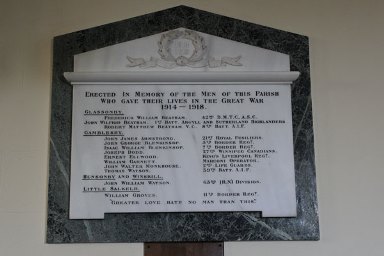
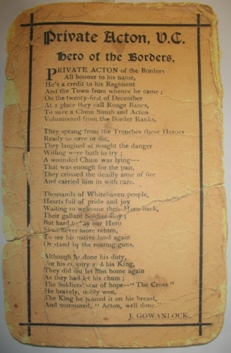
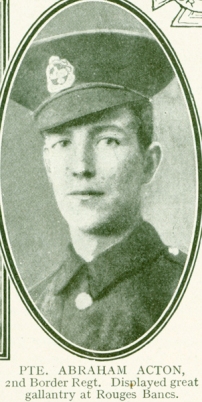
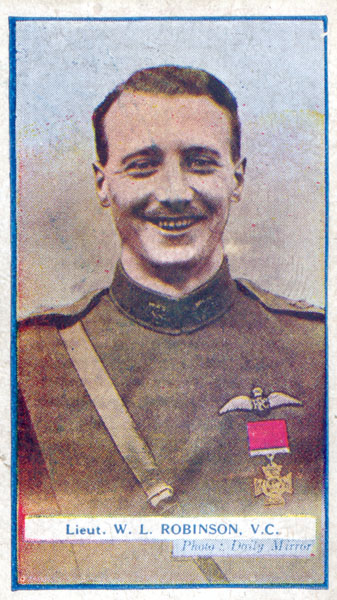

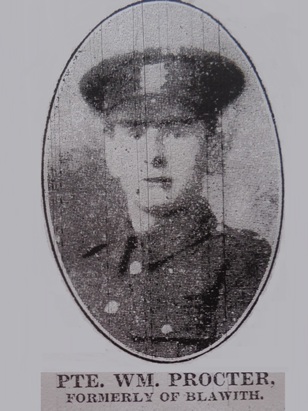
Robert Matthew Beatham VC
b. 16/06/1894 Glassonby, Cumberland. d. 09/08/1918 Rosieres, France.
Beatham was born on 16 June 1894 to John and Elizabeth Beatham, who lived at Glassonby, and he attended Maughanby School in the village. He migrated alone to Australia when he was 20. Beatham enlisted as a Private in the 8th Battalion (Victoria), Australian Imperial Force on 8 January 1915 and saw one month of active service at Gallipoli before the general evacuation to Alexandria. From there he was sent to France, arriving in Marseilles on 31 March 1916. He was wounded in action for the first time on 18 August 1916, in the Battle of the Somme. After recuperation he rejoined his unit on 30 September 1917 and was wounded for the second time on 4 October 1917 at Broodseinde during the Battle of Passchendaele; he was then evacuated to England for treatment and recovery.
Beatham rejoined his unit on the Western Front in February 1918. He was 24 years old, and still a private when he was killed in action at Rosières, on the second day of the Battle of Amiens. He was posthumously awarded the Victoria Cross for most conspicuous bravery and self-sacrifice during the attack north of Rosieres, east of Amiens, on 9th August 1918. When the advance was held up by heavy machine gun fire, Private Beatham dashed forward, and, assisted by one man, bombed and fought the crews of four enemy machine guns, killing ten of them and capturing ten others, thus facilitating the advance and saving many casualties. When the final objective was reached, although previously wounded, he again dashed forward and bombed a machine gun, being riddled with bullets and killed in doing so.
His name is on the War Memorial in Addingham Church.
Poem for a fallen hero
By Joseph Ritson
During the First World War poetry was one of the things that linked the soldiers at the Front with the folks back home. Soldiers and civilians alike put pen to paper expressing their thoughts and feelings through verse. Some of the poets and their poems are still remembered and often quoted a century later - think of Wilfred Owen, Siegfried Sassoon, John McCrae and Laurence Binyon.
Yet each local community throughout the land will have had its own war poets. Even though the vast majority of these local war poets have been forgotten, or almost forgotten, it is still possible to come across these poems. Throughout the war local newspapers printed poems reflecting the feelings of the time. Those for Cumbria can be rediscovered at the county's local libraries and archives.
Sometimes wartime poems written at home were printed on postcards and sent to friends and family elsewhere. One example [see image] is a poem entitled "Private Acton, V.C., hero of the Borders" by Mr J. Gowanlock. It expresses the great pride and joy of the people of Whitehaven that one of its 'soldier boys' had been awarded the Victoria Cross for gallantry along with Private Smith of Workington for saving the life of a seriously wounded comrade. This pride and joy is tempered by the sadness of knowing that Private Acton had later made the ultimate sacrifice and would never return home although his pal James Smith had been allowed home.
This is Mr J. Gowanlock's poem about Abraham Acton V.C.:
Private Acton, V.C., hero of the Borders
Private Acton of the Borders
All honour to his name,
He's a credit to his Regiment
And the Town from whence he came;
On the twenty-first of December
At a place they call Rouge Bancs,
To save a Chum Smith and Acton
Volunteered from the Border Ranks.
They sprang from the Trenches these Heroes
Ready to save or die,
They laughed at nought the danger
Willing were both to try;
A wounded Chum was lying ---
That was enough for the pair,
They crossed the deadly zone of fire
And carried him in with care.
Thousands of Whitehaven people,
Hearts full of pride and joy
Waiting to welcome their hero back,
Their gallant soldier boy;
But hard to say our Hero
Shall never more return,
To see his native land again
Or stand by the Roaring Guns.
Although he done his duty,
For his country and his King,
They did not let him home again
As they had let his Chum;
The Soldiers' star of hope -- "The Cross"
He bravely, nobly won,
The King he pinned it on his breast,
And murmured, "Acton, well done."
Workington awaits its Conquering Hero
By Joseph Ritson
Two West Cumbrian soldiers serving with the Border Regiment were among the earliest recipients of the Victoria Cross in the 1914 - 1918 war: Private James Alexander Glenn Smith, V.C. from Workington and Private Abraham Acton, V.C. from Whitehaven. On 21 December 1914 Privates Smith and Acton successfully rescued two severely wounded comrades from "No Man's Land" under heavy enemy fire. The announcement that they had been awarded the Victoria Cross was made on 18 February 1915.
Back home, civic leaders and townsfolk in Workington and Whitehaven alike received the news about the Victoria Cross awards with great pride and joy. Each town would eventually honour their own home grown hero. Because of the fortunes of war one town, Workington, would welcome its hero back home while Whitehaven could only honour its hero posthumously.
Abraham Acton V.C. would never see home again. While still in the frontline, in May 1915 he was killed in action. He was honoured by having his portrait painted in oil by the celebrated local artist J.D. Kenworthy which was presented to Whitehaven Borough Council. For many years this portrait hung in the Council Chamber as an inspiration to the decision makers of the Borough.
By contrast, in March 1915 James Smith V.C. of Workington received a gunshot wound to the left arm during the Battle of Neuve Chapelle. Fortunately it was a "Blighty wound" and he was sent to a hospital in southern England. James Smith V.C. would eventually get his well deserved enthusiastic welcome home. However, beforehand there is an almost comical footnote about Workington's anticipation of the arrival of its hero which was reported by the 'West Cumberland Times' on 17 April 1915
On Friday 16 April 1915, after being discharged from hospital, James Smith V.C. sent a telegram to his father from Southampton to say he was on his way to Workington. In the days before T.V., radio and the internet, word of James Smith's imminent arrival was passed round the town by word of mouth.
The Mayor was away on business at Barrow-in-Furness so he was sent an urgent telegram. Meanwhile the rest of the Town Council assembled at Workington's Commercial Hotel, a detachment of soldiers under Lieutenant Bouch lined up on Station Square and the Town Band marched through the town to the railway station. A large crowd of Workingtonians waited outside the station in expectation.
There was but one thing that spoiled the great day - James Smith V.C. failed to arrive. He had been unable to make the last train to Workington. By 7.30 p.m. everyone waiting for him at the station realised this. The soldiers and the band marched away and the crowd dispersed, only to return another day when James Smith, V.C., Workington's 'conquering hero' returned home and was escorted to his father's house on a wave of enthusiasm.
Local Victoria Crosses
by Denis Perriam
At Buckingham Palace in 1920, King George V hosted a garden party for all the surviving recipients of the Victoria Cross. As some awards were posthumous, the widow or nearest relative were invited. There were 320 VCs at the event and, with relatives, 1,000 people attended, including Lt-Col James Forbes Robertson and Sergeant Charles Edward Spackman, both from the Border Regiment. Also there were the parents of Lieut Collin from Carlisle, Sergeant Edward Smith of Maryport, Sergeant Lauder, who had been in the Chadwick Hospital in Carlisle, and George Richardson, a veteran of the Indian Mutiny from the 34th Regiment, who had emigrated to Canada.
In the Carlisle Journal in April 1919 was a list of local VCs which, as well as those already mentioned, had the Rev TB Hardy, Major AM Lafone and Sergeant Mott. It was incomplete because it did not include Private Beatham of Australia, who emigrated from Glassonby and from where his mother had travelled a month earlier, to receive his posthumous VC from the King. Also missing were Lieut-Commander Boyle RN, who was believed to be the only one actually born in Carlisle, and Private Acton of Whitehaven.
The problem of compiling a list of local servicemen who had been awarded the Victoria Cross is - where qualifies as local? Many soldiers who served in the 34th Cumberland and 55th Westmorland Regiments, later the Border Regiment, were rarely from Cumbria and most Cumbrians who did receive the medals were not in those regiments. There were also men from the Royal Navy and Royal Flying Corps, who had county connections, as recipients.
For instance, lists in the Carlisle newspapers were for Cumberland and so did not include VCs from the south of what is now Cumbria so, Private Samuel Wassell of Barrow-in-Furness, who won his medal in the Zulu Wars in 1870, and Lance-Corporal James Hewiston of Coniston, a World War One recipient, are not included.
There was also Lt-Col Best-Dunkley of Barrow, his VC being given to his widow in 1917. Then there was William Procter, who was born in Blawith and moved to Kendal as a baby, where he was honoured in 1915 for his VC.
Private Christian, formerly of Ulverston, but lived in Low Mill, Egremont received his VC in 1916. A year earlier there was a civic reception at Barrow for Lt Foreshaw after winning his VC.
A similar reunion to that in 1920 was hosted by the Prince of Wales in 1929. Of the 500 VCs who were thought to be alive, 350 had been traced and were invited. Most of those who could not be found had emigrated.
One local who attended and who is not listed elsewhere is TF Mayson of Silecroft.
Then there were the old boys from St. Bees School, three of whom were World War One recipients of the VC, two posthumously. The most famous of these was Captain W Leefe Robinson, who as an airman in the Royal Flying Corps, attacked and brought down a Zeppelin. He died of flu in December 1918.
Four from Sedbergh School received the VC.
There was also a report in the Cumberland News in 1948, entitled "Border VC's Grave in Canada." A search was being made for the grave of Private Brown who supposedly won the VC in 1859. But his name does not appear in The Register of the Victoria Cross.
Sergeant Major Lucas, who received his VC in New Zealand in 1861, was on garrison duty with the 40th Regiment at Carlisle Castle in 1869, when a ball was held there to mark his 21 years service and retirement.
In 1923, the Journal featured Sir Gerald Graham, who was described as the "first true Cumbrian to win the VC in the Crimean War in 1855." He was born in 1831, the son of Dr Graham of Eden Brows.
The best known local VC was Second Lieut Joseph H Collin, who was born in Jarrow in 1893, but had come to Carlisle as a child with his parents. He was working in a tailors on English Street when he enlisted. On 9 April 1918, at Givenchy in France, Collin was in charge of a platoon with only five survivors and was having to withdraw under heavy fire. Single-handedly, he attacked a machine gun with his revolver, disabling its team with a grenade. Then, with a Lewis gun, he engaged a second enemy machine gun until mortally wounded.
Because Collin was a keen athlete, the Cumberland and Westmorland Wrestling and Athletic Association, of which he was a member, decided to offer an annual trophy in his memory in 1919, to be called the Collin Shield. Fellow shop workers decided in 1920 to open a Collin VC Memorial Institute, which had 140 members and met in rooms over the entrance to the Covered Market in Scotch Street.
Lieut Collin's name appears on two war memorials in the city. Because he lived on Petteril Terrace, his name is inscribed on the Harraby War Memorial on London Road. But as he was a Roman Catholic and attended Our Lady and St. Joseph's RC Church on Warwick Road, his name is also on the war memorial there.
In 1918, there was a children's contest in the Journal, for the best telegram to the winner of a VC. Constance Roper of Wasdale wrote "Dear Unknown Tommy, A girl's warmest congratulations on splendid bravery and honour achieved. God grant you health and speedy safe return - Well-wisher."
Private William Procter, V.C. of Blawith and Kendal
By Joseph Ritson
At the end of March 1915 the local Cumbrian newspapers reported the heroic deeds on the Western Front of a young Border Regiment soldier, Private William Procter, 12086, 3rd Battalion The Border Regiment. Private Procter had been born at Blawith near Coniston before moving with his family to live at Kendal. For his great gallantry under enemy fire and despite being badly wounded himself, it was reported that Private Procter had been awarded the Victoria Cross. The gallant deed had been carried out at La Bassée in northern France on 27 February 1915. One of the soldiers rescued by Private Procter was Captain Jones from Keswick while the second was Sergeant Holland from Kirkham. Coming, as it did, shortly after the announcement of the Victoria Cross being conveyed upon two other Borderers, Privates Acton and Smith, here was yet further proof that soldiers from the local Border Regiment were doing great deeds above and beyond the call of duty in the fight against the Hun.
Articles about Private Procter V.C., and his gallant act appeared in the 'Westmorland Gazette' and the 'Whitehaven News'. Following a special private meeting of Kendal Town Council the Mayor announced the opening of special fund for Private Procter to purchase an illuminated certificate, an inscribed gold watch and gold watch chain. The remainder of the money raised would be placed in a special bank account for the benefit of their hero. His V.C. presentation ceremony at Buckingham Palace was reported as having been arranged for Wednesday 21 April 1915. All Kendal rejoiced and festivities were arranged for when their hero arrived back in Kendal after attending the Royal reception.
It was at this point that the grand tale of "derring do" by a local Kendal lad 'made good' began to unravel. The Town Council began to have suspicions when there was no notification regarding the hero's return. After contacting the War Office, this was the reply received by telegram: "Your letter of yesterday. No man named Procter has been awarded the Victoria Cross. No truth in statement that he has been ordered to attend at Buckingham Palace."
When William Procter was tracked down and challenged about the proceedings he is reported to have said that "… up to date he had received no official intimation of any nature …" Consequently, all the municipal celebrations in Kendal were cancelled and the subscriptions received for the 'Procter Fund' were returned.
Shortly afterwards, William Procter went A.W.O.L. According to the Regimental records at Cumbria's Museum of Military Life, Kendal's supposed V.C. had not even served on the Western Front. In fact, after going A.W.O.L. Private Procter never returned to the Army. He still owes the War Office for the bill that was raised for the non-return of his uniform. Unsurprisingly, at the end of the war he received no campaign or service medals.
Once the truth was out, how did Kendal regard its 'supposed V.C.' local hero? It was aptly summed up in the 'Cumberland News' report of this sorry tale: why did no one think of making an earlier enquiry to the War Office? Kendal was one of the main recruitment centres for the Border Regiment and the town took a somewhat philosophical view of the 'Procter V.C. hoax' which was "… alternating between annoyance and amusement …"
For a few weeks March and April 1915 Private William Procter V.C. was feted as Kendal's finest ever hero. He turned out to be nothing but a hoaxer who disappeared when the truth became known.

